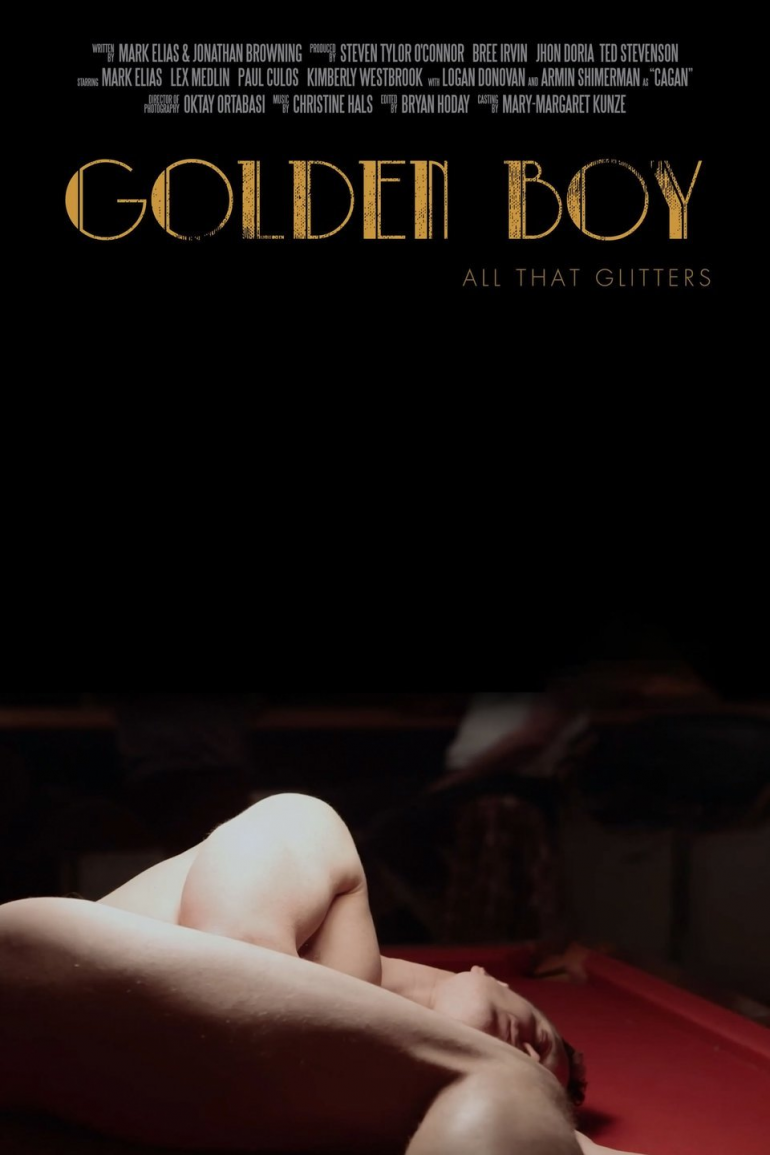CONTENT WARNING: Drug Abuse, Sexual Assault, Sexual Exploitation
Golden Boy attempts to tell a story about a troubled man meandering his way through the social and economic troubles of Los Angeles. The movie recently won awards for Best Director in a Feature Film, Stoney Westmoreland, at the California Independent Film Festival and Best Screenplay, Mark Elias and Jonathan Browning, at FilmOut San Diego. Well-done performances by Mark Elias (James), Logan Donovan (Houston), and Paul Culos (Josh) keep the viewer interested as their complex relationships with one another develop throughout the movie. Nonetheless, the film lacks a firm focus and direction for most of the story and only shows some artistry in the last twenty minutes.
It is quite evident from the beginning of the film that James, the main character, is struggling with life. Unable to pay rent, James is evicted from his lackluster apartment with nowhere to go. One night, he wanders the parks of Los Angeles and notices men getting picked up by others in what appears to be prostitution. Desperate, James follows suit, and a wealthy man named CQ (Lex Medlin) picks him up, seemingly rescuing him from the streets.
CQ’s source of wealth is not disguised for very long. James becomes CQ’s runner, delivering suspicious packages in a dirty, worn-out Peppa Pig backpack to a wide variety of clients. With CQ as his only sense of stability, James soon becomes trapped in a vicious drug dealing business with no means of escape. Not only is James caught up in dealing, but he becomes subject to the party and drug scene, often associated with big cities. James quickly becomes addicted to cocaine and partying due to his wild friend Houston, who he meets at a dinner party through CQ.
The only silver lining James finds in this situation is Josh. Finding James passed out on the street after a long night of alcohol and cocaine, Josh takes him into his home and offers him breakfast. The two fall into an interesting relationship that borders on friendship and romance; leaving the viewer to root for them throughout the movie.
The remainder of the movie follows James’s journey between two lives– one full of drugs and sex, and the other with someone he truly cares about.
The overall storyline fails to keep viewers entertained. The film feels like it is never really going anywhere, and yet simultaneously feels rushed. For example, James struggles back-and-forth with cocaine addiction, yet constantly abides by and still delivers CQ’s orders with minimal pushback. Despite saying things like “I’m done,” James immediately succumbs to his old, destructive habits without any real explanation. This story falls short of achieving something great but could have if more time was given. The relationship between CQ and James could have been more developed, showing more about how CQ manipulates James in the relationship, instead of leaving viewers more confused.
Not only does the film underwhelm the viewer with an underdeveloped plot, but the characters are just as weak– leaving viewers to ask, “Why should I care?” in the back of their minds. The characters in the film lack true direction for an overwhelming portion of the movie; James’s character lacks any real development at all. The story made it seem like I should have cared about where James, Houston, and Josh ended up at the end of their journeys. However, the only person I cared about, a little, was Josh: a character the director and writer threw into the crossfires of sloppy plot. Because the film relies on choppy dialogue to push the story forward, character development seems like an afterthought. If the movie wanted to evoke more empathy from its viewers, it could have spent more time working on character development than trying to develop a plot that fell through.
There is one scene in the film that I found to be a directorial achievement because it manages to display vulnerability and emotional complexity, unlike previous scenes. James is on another run for CQ, this one sexual, and is drugged by a group of men. Following the drugging, these men proceed to gang rape James. The film cuts to the aftermath of the event and shows a more vulnerable James, who now realizes the real danger CQ presents to him. Although special effects of a strobe lighting and awkward cutting to flash-back/-forward moments distract the viewer, the artistic storytelling that occurs is done without dialogue, for once. The absence of clunky dialogue allows the actual cinematography to speak for itself. The most development in both plot and character occurs during this scene, but it is a shame it happens ten minutes from the end.
The film ends as abruptly as possible. In an attempt to escape CQ’s madness, James goes to see Houston and upon arrival realizes he has overdosed. James panics and brings Houston to CQ for help, who appears to revive Houston, yet he remains unconscious on the floor. Trying to make a break for it, James starts to stash CQ’s drug money in a backpack, but CQ catches him. CQ hits James over the head with a baseball bat, and right before CQ can administer another blow, Houston shoots CQ in the chest. As a final shot, sirens ring in the background, and James and Josh drive away together. This finale is so rushed it feels like it was the only thing the writers could come up with to end the film, and they went with it. It does nothing to tie up loose ends. It simply ends the movie, leaving viewers taken aback.
In summary, Golden Boy lacks depth in both its plot and character development, but in the few moments the film shines, it details an emotional journey about a man trying to find his purpose and position in life.

